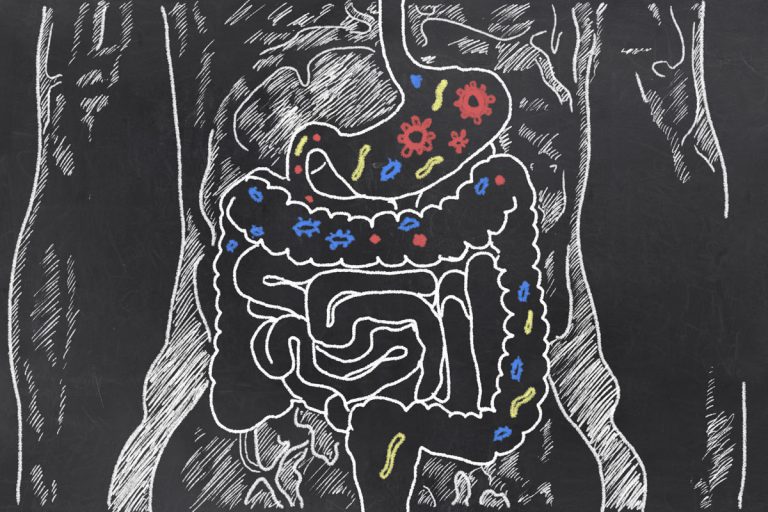We traditionally think of bacteria as dirty, something we want to keep outside of our bodies. Intestinal bacteria are very important for digestion; they break complex fiber polysaccharides (sugar molecules connected to each other), into simple absorbable sugars by a process called fermentation, converting nutrients into calories. The large intestine houses over 1400 species of bacteria, numbering over 100 trillion. Reality is that the human body contains ten times more microbial cells than human cells, and the human body is dependent upon the genetic information encoded in these bacterial cells for specific metabolic pathways.
Our microbial partners have coevolved with us, in a beneficial (symbiotic) relationships, involving nutrient sharing. The ability to store energy would be a beneficial attribute for ancient humans, who had variable access to food, and when nutrient dense food supply was available, consuming it and storing it would benefit both the human and its bacterial symbiotes later when food supplies were diminished. However, in modern, developed societies, where there is ready access to large-portion, high-calorie diets, this “benefit” becomes a detriment, and we develop a previously rare condition (historically seen in the wealthy) called over nutrition, over storage, or obesity
Obese individuals have a different mix of bacteria in their guts than thin people. The ratio of Firmicutes to Bacteroidetes (called the F/B ratio) is higher in obese people than in lean people, and it drops as those people lose weight. Both Firmicutes and Bacteroidetes bacteria are involved in complex polysaccharide breakdown, but Firmicutes are much more efficient than Bacteroidetes bacteria, and having more Firmicutes bacteria in our gut makes more energy available, leading to increased caloric intake and eventually obesity. Firmicutes overload is also associated slowed intestinal motility [chronic constipation].
In studies of genetically identical twins, bacterial populations have been found to differ, depending on whether the twin is lean or obese, with much higher level of Firmicutes in the obese twins. In obese patients undergoing gastric bypass surgery, colonic bacteria change to become more like those of normal-weight individuals after the operation, reducing their Firmicutes levels.
Antibiotic over utilization may also indiscriminately eradicate the beneficial bacteria in your gut along with the bad ones. Conventional farmed meats are doped with antibiotics, with nearly 50-70% of all antibiotics produced in the United States used on healthy livestock to promote growth and weight gain in the animal feed. Consuming these antibiotic-laden meats may be a significant factor enhancing growth and weight in the human population [obesity] as well. This further stresses the importance of eating grass-fed and organically raised meats of all kinds.
The amazing thing to keep in mind is that you can rapidly change your gut bacteria within 72 hours, to a healthy ratio, simply by immediately eliminating refined carbohydrates and increasing your fiber intake. Supplements of “get thin bacteria” will soon be available as well.

